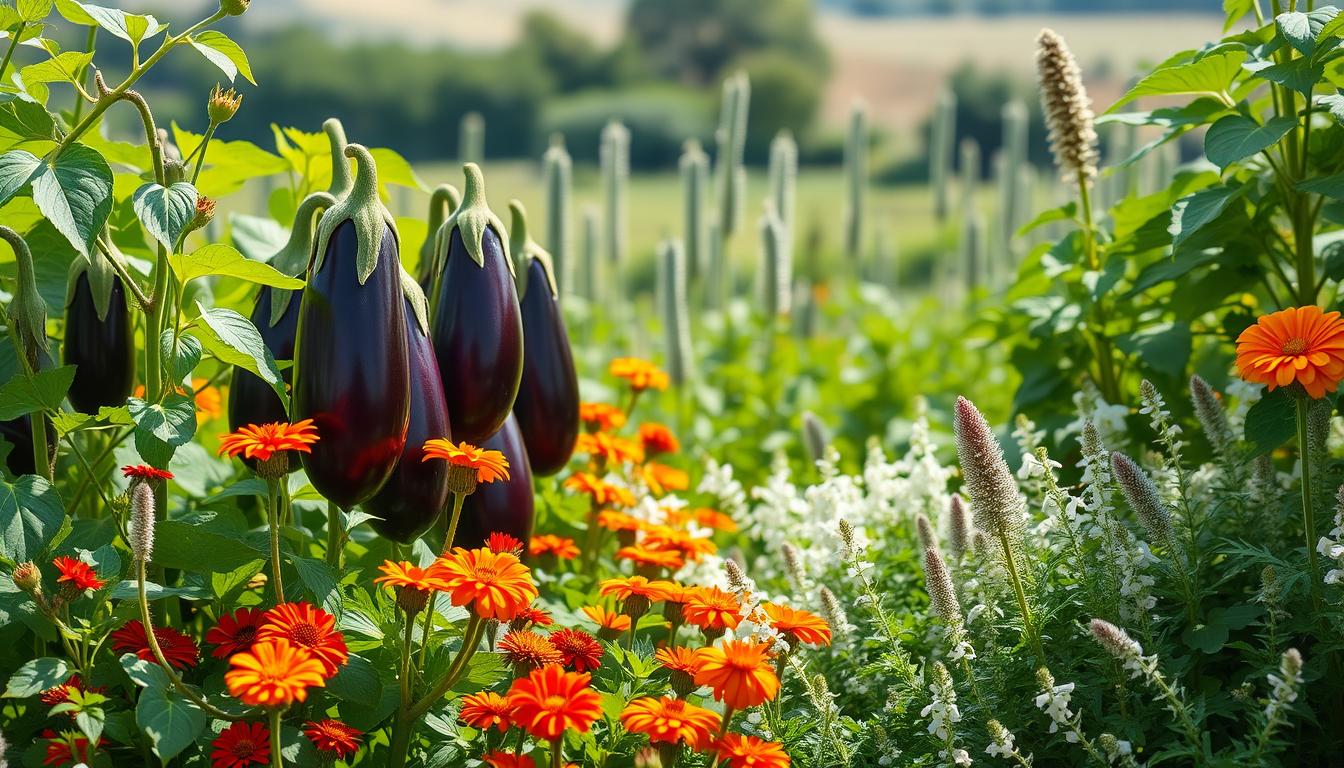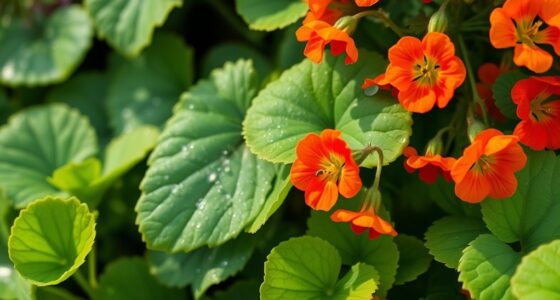Imagine stepping into your garden, the sun warming your back, and the aroma of fresh herbs and vegetables filling the air. Among your flourishing plants, eggplants stand tall, their deep purple skins gleaming. But what if I told you that the secret to an even more bountiful harvest lies in the friendships you cultivate between plants? By choosing the right eggplant companion plants, you can enhance growth, deter pesky pests, and boost soil health, creating a thriving ecosystem right in your backyard. Let’s embark on this journey together and explore the best companion plants for eggplant, ensuring your garden is not only productive but also a beautiful sanctuary.
Key Takeaways
- Companion planting enhances the growth of eggplants through strategic pairings.
- Choosing the best companion plants for eggplant can deter pests naturally.
- Healthy soil results from the right planting partnerships in your garden.
- A thriving garden ecosystem supports a more abundant eggplant harvest.
- Understanding these relationships can help you maximize your gardening efforts.
Understanding the Benefits of Companion Planting
Companion planting is an age-old gardening practice that pairs different plants to create a thriving ecosystem. This strategy enhances the health and productivity of your garden, making it a valuable technique for any gardener. With an eggplant companion planting guide, you can discover the various companion plants that contribute to healthier growth and bountiful harvests.
What is Companion Planting?
Companion planting involves grouping plants together for mutual benefit. This technique can improve plant growth, deter pests, and enhance soil quality. By strategically selecting companions, you can take full advantage of the interrelationships between plants, leading to a vibrant and productive garden.
Why Choose Companion Plants for Eggplants?
When you select companion plants for eggplants, you maximize their growth potential. Choosing the right companions can result in improved yields. Certain plants can attract beneficial insects, which pollinate your eggplants and provide natural pest control. This enhances the overall health of your garden, showcasing the benefits of companion planting.
How It Enhances Plant Growth
Companion planting acts as a natural fertilizer, as some companions can boost nutrient availability in the soil. This leads to stronger plants and a more balanced ecosystem. A well-planned eggplant companion planting guide not only demonstrates which plants thrive together but also illustrates how this method results in more robust and productive gardens.
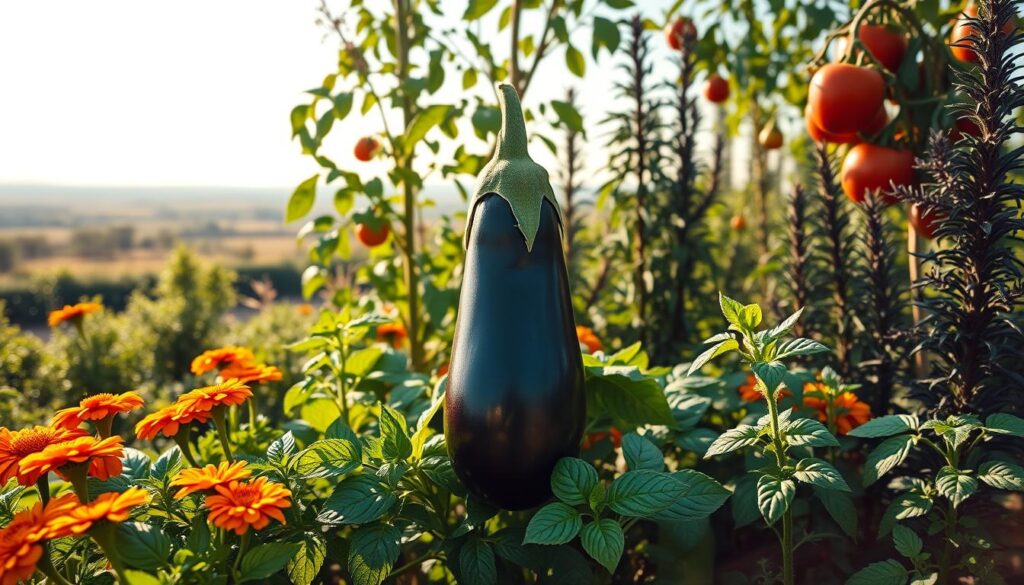
Ideal Companion Plants for Eggplants
When cultivating an eggplant garden, selecting the right companions is essential for nurturing healthy plants. Certain species harmonize beautifully with eggplants, enhancing growth and providing natural pest control. Here are some of the top choices that work well together.
Basil: A Flavorful Friend
Basil stands out as one of the most ideal companions for eggplant. This aromatic herb not only elevates the flavor of your dishes but also deters pests. The strong scent of basil keeps aphids and spider mites away, ensuring your eggplants remain healthy. You’ll find that planting basil alongside your eggplants can lead to richer flavors in your harvest.
Marigolds: Natural Pest Control
Marigolds are another fantastic choice as eggplant garden companions. These vibrant flowers produce a scent that repels nematodes and various garden pests. By planting marigolds near your eggplants, you create a friendly environment that promotes growth and minimizes pest interference, leading to a bountiful harvest.
Peppers: A Common Garden Mate
Peppers and eggplants share similar growth conditions, making them excellent garden mates. Both thrive in warmth and require comparable nutrients, which encourages efficient use of garden space. This mutual benefit creates a balanced ecosystem, resulting in a more diverse array of produce for your kitchen.
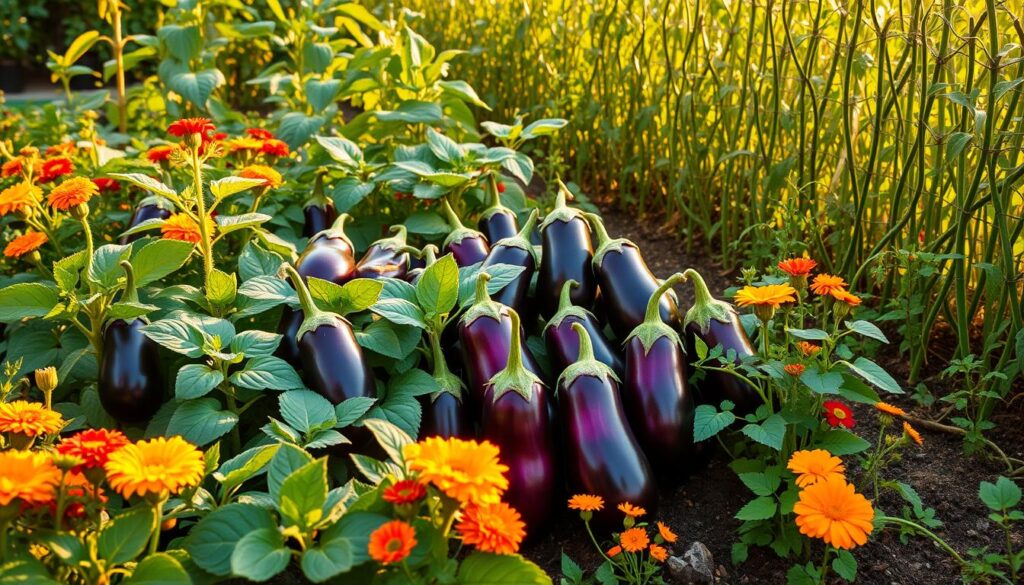
Plants to Avoid Near Eggplants
Understanding which plants to avoid near eggplants is crucial for ensuring their healthy growth. Certain plants not only compete for nutrients but may also introduce pests that specifically target eggplants. Being aware of these potential conflicts can greatly impact your yield and overall plant health.
Why Some Plants Don’t Pair Well
Not all plants make good eggplant planting partners. Plants that share similar pest pressures or nutrient demands can hinder the growth of eggplants. This can lead to stunted growth or increased susceptibility to diseases. Identifying these problematic plants early on helps in maintaining a thriving garden environment.
Specific Plants That May Harm Eggplants
- Tomatoes: Members of the nightshade family alongside eggplants and attract similar pests.
- Potatoes: Another nightshade that can promote diseases, affecting eggplant health.
- Melons: These heavy feeders compete for nutrients, which can stunt eggplant growth.
- Cucumbers: Like melons, they tend to consume a lot of nutrients, leaving eggplants deprived.
- Zucchinis: They require substantial resources that can conflict with the needs of eggplants.
- Fennel: Known to inhibit eggplant growth and damage their overall health.
- Geraniums: These flowers can disrupt the development of nearby eggplants.
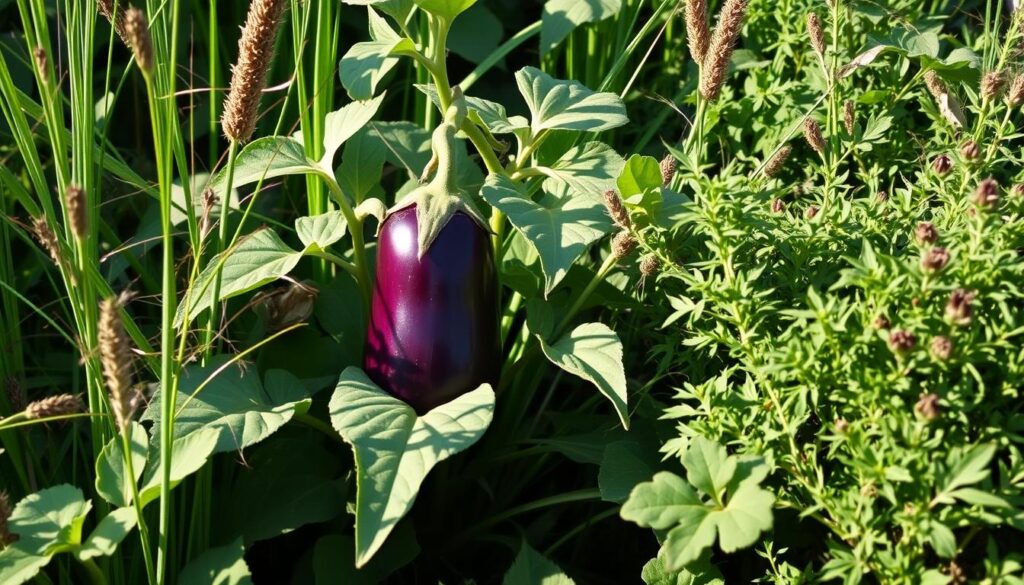
Nutrient Requirements of Eggplants
Understanding the eggplant nutrient requirements is essential for cultivating robust and fruitful plants. Eggplants, known for their vibrant color and rich flavor, thrive in fertile conditions. These plants are particularly demanding when it comes to nutrition, needing a steady supply of vital elements.
Key Nutrients for Healthy Growth
Eggplants primarily require nitrogen, phosphorus, and potassium, tailored to support their growth cycle. Nitrogen promotes leafy growth, phosphorus drives root and flower development, while potassium enhances overall health and disease resistance. Proper attention to these nutrients will help you harvest a bountiful crop.
How Companion Plants Help Fulfill Nutrient Needs
Incorporating companion plants for eggplant growth can significantly enrich the soil. For instance, legumes such as beans act as nitrogen fixers, naturally replenishing this crucial nutrient. Meanwhile, brassicas enhance soil health by releasing organic compounds that bolster nutrient absorption. A strategic mix of heavy and light feeders will create an environment conducive to eggplant thriving.
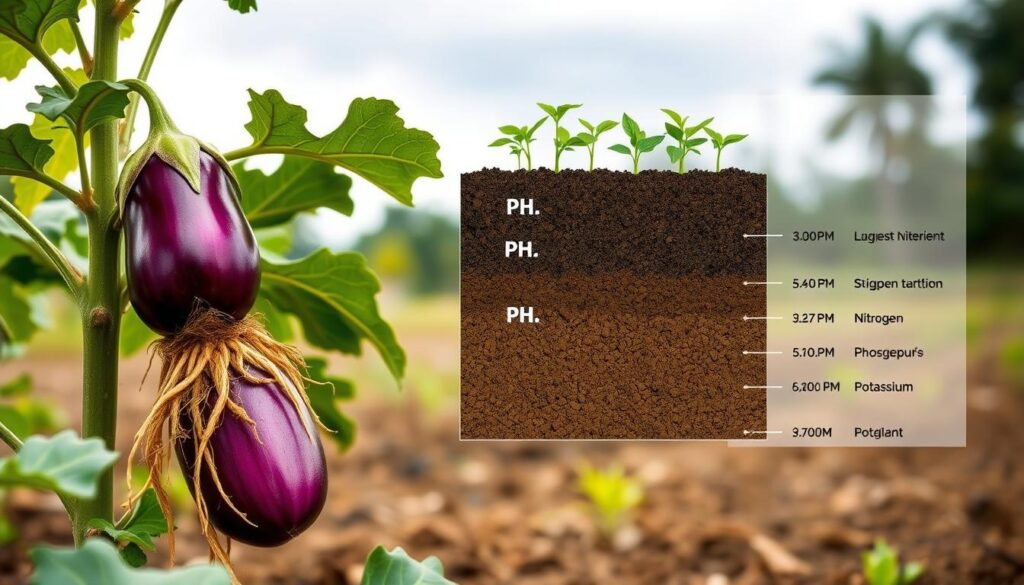
Pest Management with Companion Plants
Effective pest management is crucial for a thriving eggplant garden. Utilizing companion plants can play a significant role in eggplant pest control, creating an environment that naturally discourages harmful insects while encouraging beneficial ones. This approach minimizes reliance on chemical interventions, leading to a healthier garden ecosystem.
How Companion Plants Deter Pests
Many companion plants emit scents that repel common pests. For instance, marigolds are known to deter nematodes and aphids due to their fragrant oils. Incorporating these plants alongside your eggplants not only keeps unwanted pests at bay but also enhances the overall health of your garden.
Natural Predators for Eggplant Protection
Some companion plants attract predatory insects that feast on pests that threaten eggplants. Borage, for example, draws in bees and predatory wasps that aid in controlling pest populations. By fostering a community of natural predators in your garden, you create a balanced ecosystem that benefits your crops while ensuring effective pest management.
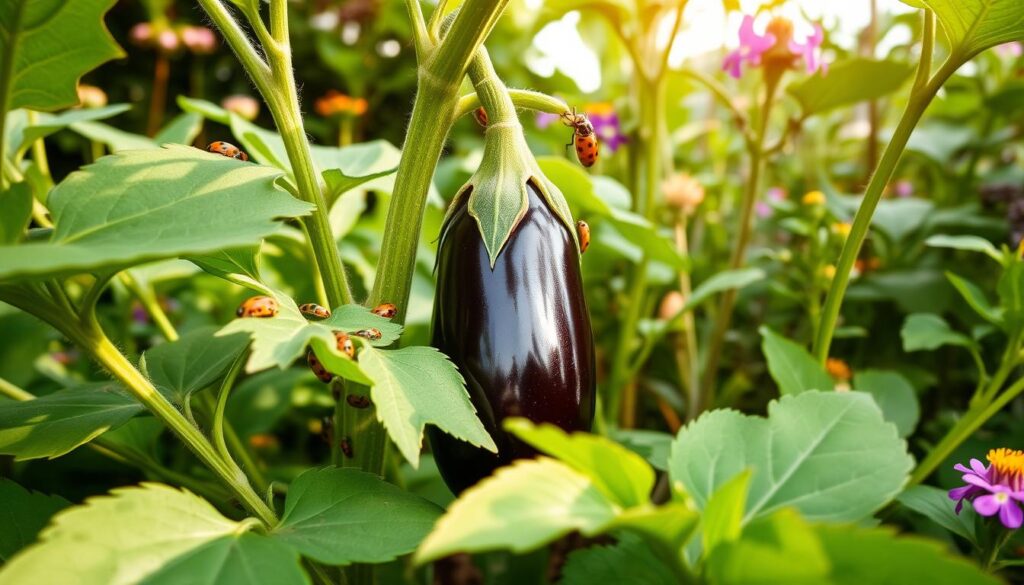
Enhancing Soil Quality for Eggplants
Soil health is fundamental for successful eggplant cultivation. By utilizing companion plants for soil health, you contribute to enhancing soil quality and improving soil fertility. Certain plants support soil structure, while others provide essential nutrients that encourage vigorous eggplant growth.
The Role of Companion Plants in Soil Health
Companion plants serve as vital allies in maintaining robust soil health. They elevate microbial activity and add organic matter through their leaves and roots as they decompose. This biological activity encourages a thriving ecosystem in the garden, ensuring that nutrient availability increases. For instance, planting legumes like beans can boost nitrogen levels in the soil, which eggplants require for healthy growth.
Selecting Plants That Improve Soil Nutrients
When selecting companion plants, consider those that are particularly effective at enriching soil fertility. Incorporating plants such as clover or vetch benefits the soil by fixing nitrogen, leading to enhanced soil quality. Each of these plants brings unique properties that ultimately support the needs of your eggplants, creating an environment that fosters strong, healthy plants and yields.
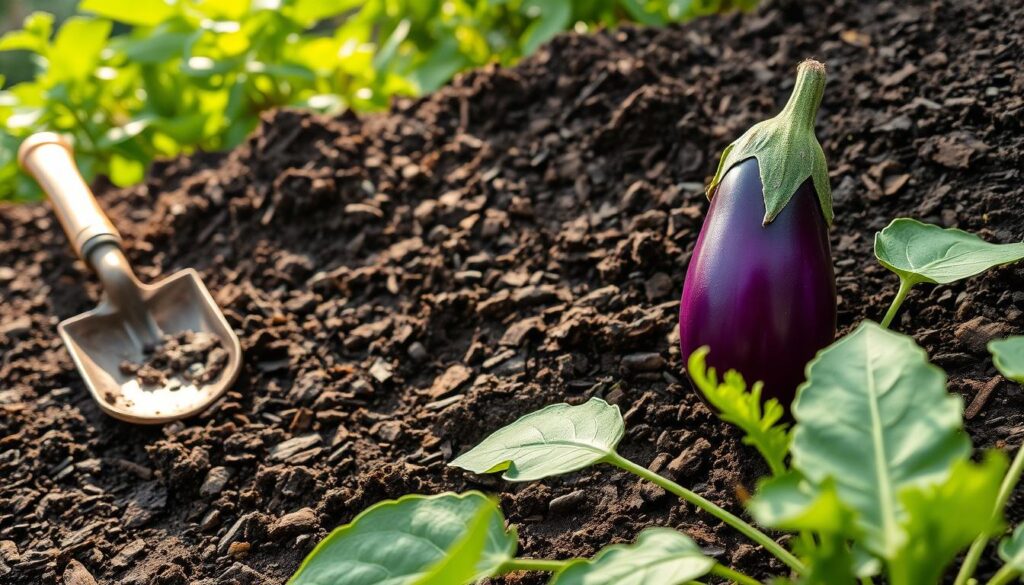
Attracting Beneficial Insects
Creating an inviting environment for beneficial insects plays a crucial role in maintaining a healthy garden, particularly for growing eggplants. These insects contribute to eggplant pollination and help enhance overall plant health. By planting specific flowers and herbs, you can effectively draw in a variety of helpful creatures.
Insects That Help Your Eggplants Thrive
Pollinators such as bees and butterflies are essential for boosting eggplant production. These insects assist in the fertilization process, leading to more fruitful harvests. Additionally, predatory insects like ladybugs and lacewings help keep pest populations in check, providing a natural form of pest control while ensuring your eggplants stay healthy and productive.
Plants That Attract Pollinators
Incorporating plants that attract beneficial insects will foster a more robust ecosystem for your garden. Try including:
- Marigolds – Brightly colored flowers that are known for drawing in bees.
- Borage – A herb that provides nectar for pollinators and can also improve eggplant flavor.
- Nasturtiums – They not only attract pollinators but also serve as a trap crop for aphids.
These plant choices not only aid in attracting beneficial insects but also enhance the overall vitality of your eggplants, promoting successful growth and fruitful yields.
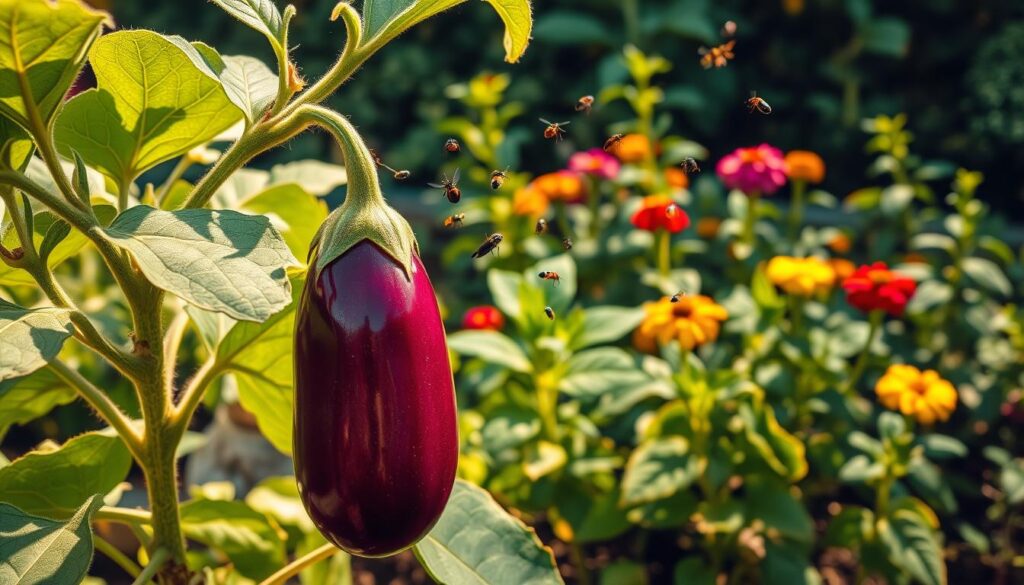
Seasonal Companion Planting Guidelines
Timing plays a crucial role in successful seasonal companion planting, especially when dealing with eggplants. Understanding the specific needs of eggplant growing seasons will help you select the best companions for your garden. As you plan your garden layout, consider what plants can thrive alongside eggplants during different times of the year.
Best Spring Companions for Eggplants
In spring, fast-growing crops emerge as ideal partners for eggplants. Utilizing garden space efficiently is key during this period. Some excellent choices include:
- Lettuce
- Radishes
- Spinach
These crops can be sown early, allowing you to harvest them before eggplants take center stage as they mature.
Summer and Fall Planting Strategies
As summer arrives, your focus shifts to maintaining harmony between your plant combinations. Consider potential competition for resources like light and water, ensuring all plants can thrive. Ideal summer companions include:
- Basil
- Peppers
For the waning light of late summer and fall, focus on cool-weather crops that love the crispness of the season. Hardy greens like:
- Kale
- Collards
These can be interspersed with your eggplants, extending the growing season and providing fresh harvests as the weather cools.
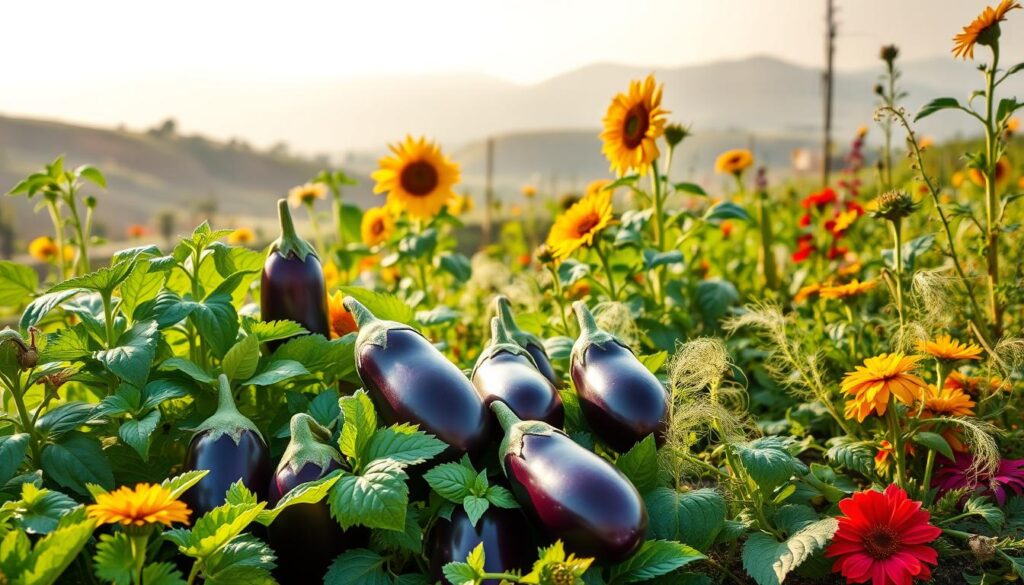
Tips for Growing Companion Plants Effectively
Successful companion gardening involves strategic planning, especially regarding space and watering needs. Ensuring that eggplants have enough room to grow can significantly impact their health and productivity. When you think about growing companion plants, understanding each plant’s specific needs becomes essential for creating a thriving garden.
Space Considerations for Eggplant and Friends
Eggplants thrive when they have sufficient space around them. Overcrowding can lead to poor air circulation, increasing the likelihood of diseases. Consider spacing your eggplants about 18 to 24 inches apart from each other and their companion plants. This distance allows for healthy growth and prevents competition for resources.
Watering Needs for Companion Plant Partnerships
Watering is another crucial aspect of growing companion plants effectively. It’s vital to group plants with similar watering requirements. For instance, basil and eggplants both enjoy moderate moisture. This approach facilitates consistent watering practices and promotes healthy growth patterns. Regularly check the moisture level in the soil to ensure your plants are thriving.
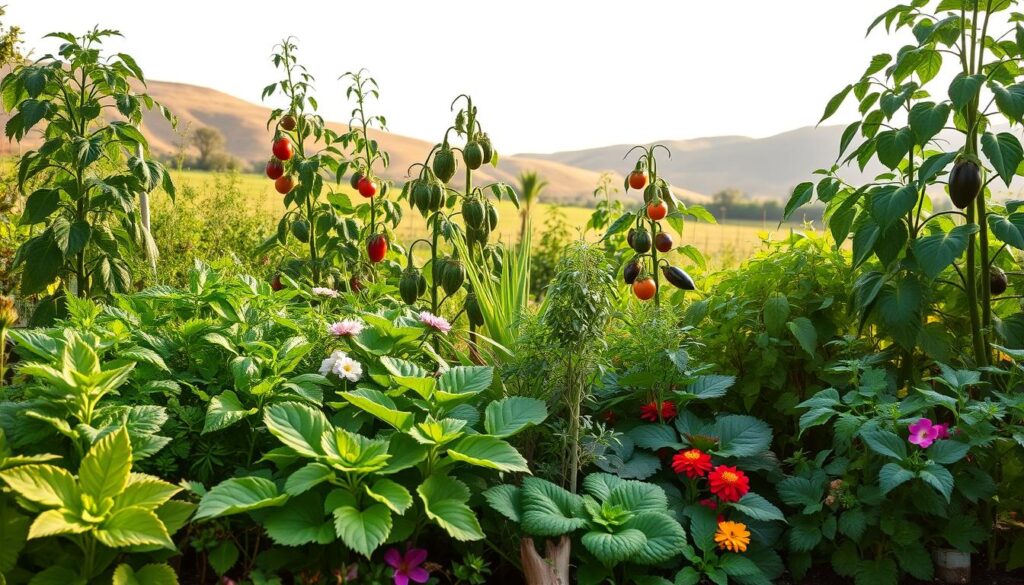
By following these best practices for companion gardening, you can create a harmonious and productive garden environment that benefits all plants involved.
Rotational Planting and Eggplants
Rotational planting is a vital technique that contributes to sustainable gardening practices. By implementing this strategy, you can enhance the long-term health of your garden, particularly when cultivating eggplants. Engaging in eggplant crop rotation helps prevent soil nutrient depletion, minimizes pest and disease buildup, and improves overall soil structure.
Benefits of Rotating Companion Plants
Adopting rotational planting methods can be particularly beneficial when dealing with eggplants. Some advantages include:
- Soil Health: Allowing different crops to grow in succession enables the soil to rest and recover. This also adds organic matter, resulting in enhanced soil fertility.
- Pest Reduction: By avoiding consecutive plantings of nightshades like tomatoes, peppers, and potatoes near your eggplants, you can significantly reduce pest infestations.
- Nutrient Management: Integrating leguminous crops into your planting schedule can increase nitrogen levels in the soil, serving as a natural fertilizer.
Best Practices for Rotation
To maximize the benefits of rotational planting, consider the following practices:
- Implement a three to four-year rotation cycle for crops to allow for full soil recovery.
- Choose crops that complement eggplants, such as legumes or leafy greens, to improve soil nutrients.
- Maintain a planting journal to track what crops have been planted in each area over the years.
- Observe the changes in pest populations and soil health to adapt your rotation plan when necessary.
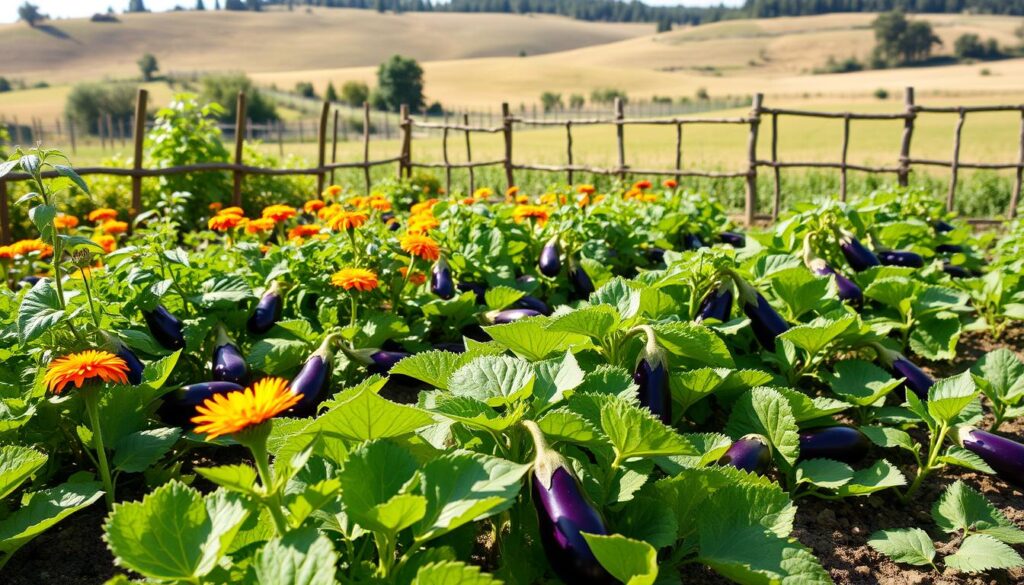
Using Companion Plants for Flavor Enhancement
Enhancing the flavor of your eggplants can be achieved through careful selection of companion plants. When combined correctly, certain herbs not only support the growth of eggplants but also contribute to their overall taste. This flavor enhancement can lead to a more savory and satisfying dish, elevating your culinary creations.
How Companions Influence Eggplant Taste
Companion plants like basil and thyme interact with eggplants in ways that enrich the soil and create a vibrant growing environment. The presence of these herbs can improve the eggplant taste improvement by infusing their own flavors into the nearby vegetables. As a result, your eggplants can yield a more distinctive and enriched profile, perfect for a variety of culinary dishes.
Herbs That Enhance Your Eggplant Dishes
Integrating herbs into your garden not only supports eggplant taste improvement but also invites beneficial insects. Basil thrives alongside eggplants, bringing a fresh aroma that complements their taste. Thyme offers robust notes that can significantly elevate your dishes prepared with eggplant. Encouraging these herbs in your garden ensures that your meals will burst with flavor.

Companion Plant Strategies for Limited Space
Gardening in limited space requires innovative approaches to ensure a productive yield. Implementing vertical growing techniques can significantly enhance your eggplant container gardening experience. By using trellises or cages, you allow your eggplants to grow upwards, freeing up valuable floor space for companion plants like beans or herbs that can spread horizontally.
Vertical Growing Techniques
Vertical gardening offers a fantastic way to maximize the efficiency of limited space gardening. Consider utilizing a variety of structures to support your plants:
- Trellises: Perfect for guiding plants upwards, trellises make the most of vertical space.
- Cages: These can provide additional support for climbing plants while maintaining order in your garden.
- Stakes: Simple and effective for taller plants, helping them reach their potential without sprawling.
Container Gardening with Eggplants
Eggplant container gardening offers versatility for those with minimal gardening space. You can grow eggplants alongside various compatible plants in manageable containers. Here are some benefits:
| Aspect | Benefit |
|---|---|
| Space Utilization | Containers allow you to effectively use small areas, like balconies or patios. |
| Mobility | Easy to move containers ensure your plants receive optimal sunlight and protection from harsh weather. |
| Soil Control | You can customize the soil mix for your plants to enhance growth and flavor. |
By embracing vertical growing and container gardening, you can successfully cultivate eggplants and their companions, even in the tightest spaces. This creative approach not only optimizes your space but also keeps your garden vibrant and productive.
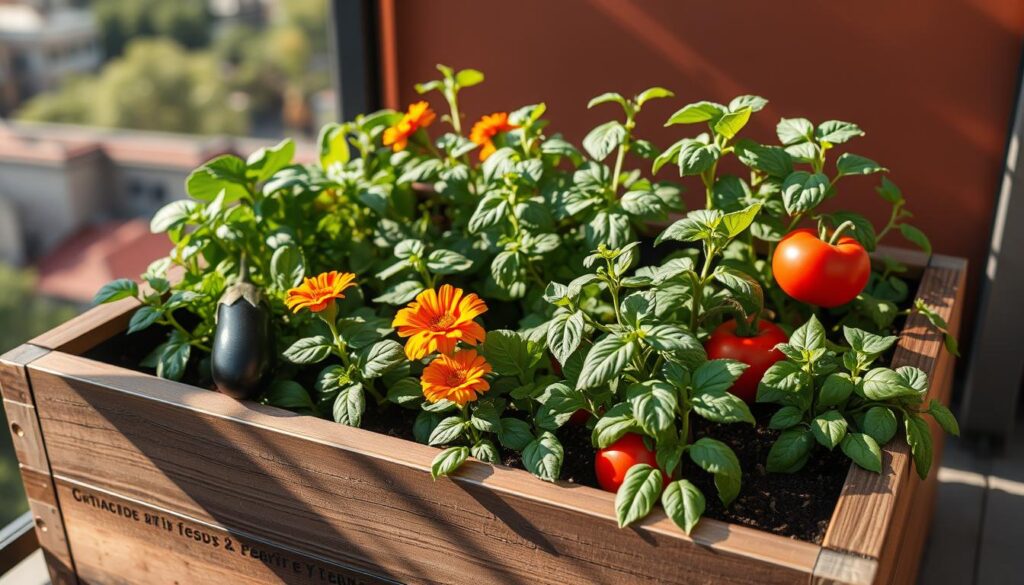
Troubleshooting Common Growing Issues
Maintaining a healthy eggplant garden requires vigilance. By being proactive, you can identify issues with your companion plants early on. This practice is essential in troubleshooting garden issues that affect overall plant health. Pay attention to signs such as wilting, discoloration, or stunted growth. These could point to underlying problems like nutrient deficiencies or pest infestations.
Signs Your Companion Plants Aren’t Thriving
If your companion plants start showing stress, it can directly impact your eggplant growth problems. Monitor your garden regularly to look for:
- Wilting: Indicates a potential lack of water or nourishment.
- Discoloration: Yellowing leaves might suggest nitrogen deficiency.
- Poor Growth: Stunted or slow growth can signal a variety of underlying issues.
How to Address Growth Challenges
When you notice signs of trouble, take immediate action. Establish proactive management techniques to maintain healthy relationships among your plants. Focus on:
- Regular Monitoring: Keep a close eye on your plants for any changes.
- Proper Watering: Ensure consistent moisture without waterlogging the roots.
- Using Natural Pest Controls: Introduce beneficial insects to deter pests while promoting a harmonious garden environment.

Conclusion: Maximizing Your Eggplant Harvest
To achieve a thriving garden, understanding the importance of companion planting is crucial, especially when aiming for the best eggplant harvest. The right partners can not only enhance growth but also provide natural pest control and improve flavor. Notable entries on your eggplant companion plant list include basil, which repels harmful insects while boosting the taste of your eggplants, and marigolds, known for their ability to deter pests effectively. Adding legumes like beans can enhance soil nutrition, providing a well-rounded support system for your eggplants.
Don’t hesitate to experiment with various combinations beyond these favorites. Each garden holds unique conditions, and personal experience can lead to discovering new synergy among plants. Through trial and error, you may find delightful pairings that invigorate both your garden and meals. Engaging actively in companion planting not only promises to maximize harvests but enriches your overall gardening journey.
As you cultivate your eggplants alongside their ideal companions, remember that gardening is as much about exploration as it is about technique. Embrace the learning process and share your findings with fellow gardeners. You might just inspire someone else to try their hand at companion planting while reaping the benefits of a bountiful harvest that beautifies your space and elevates your culinary creations.
